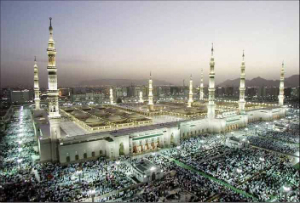
LOS ANGELES, CA (Catholic Online) - A proposal to dismantle Mohamed's tomb in Saudi Arabia, and to anonymously bury the remains of the Islamic prophet in a common grave has sparked heated debate in Saudi Arabia and highlighted differences between mainline Sunni and Shi'ite Muslims and those following a small, but powerful fundamentalist sect.
Those calling for the destruction of Mohamed's tomb are known as Wahhabi Muslims. They follow a two-century old sect of conservative Sunni Islam that calls for the purification of Islam and a strict adherence to the religion as it was practiced in the time of Mohamed and during the first three generations after his death. All teachings that follow this time, and all veneration of saints, objects and other artifacts of Islam are distractions-even heresies.
There is a striking similarity between Wahhabi Islam and the Puritan Christians of the sixteenth and seventeenth centuries. Puritans, as many remember, sought to cleanse Christianity of what was considered by some to be idolatry and heresy, returning Christian practice to how it was thought to be done during the time of Christ.
Although the Puritans were mistaken in their revolt against centuries of Christian tradition, it did not stop them from gaining political and military power, and using that power to destroy Catholic relics, shrines and churches. Catholic clerics and those who refused to abandon their beliefs were frequently persecuted making thousands of saints and martyrs.
Now, Islam is undergoing its own reformation and it appears to be no less bloody.
King Abdullah of Saudi Arabia is himself a Sunni Muslim, but his ruling house enjoys a long-standing alliance with Wahhabi practitioners. In fact, Wahhabi faithful are the dominant minority in Saudi Arabia, with nearly a quarter of the population identifying themselves as such. The Saudi government helps fund many Wahhabi missions and works. In exchange for tolerance and funding, the movement maintains its political support for the Saudi government, although this is starting to waver with the formation of the Islamic State.
The proposal to dismantle the tomb of Mohamed as a way of purifying Islam is being circulated amongst the nation's top clerics, but it is unlikely to be approved by the King, who is the official caretaker of the tomb.
Although Saudi Arabia is a largely Sunni state, Shi'ites, who are the dominant Muslim majority throughout the rest of the Islamic world, hold the shrines in high regard and would be vehemently opposed to their destruction.
The result is that the proposal threatens to divide Saudi Arabia by forcing the King to choose sides. Certainly destruction of shrines would diminish global respect and influence of the Saudi regime, however it would reinforce the weakening alliance between the Saudi government and Wahhabi adherents, some of who are militant in their practice.
For now, it remains unlikely that the King would approve such drastic action, even in the face of growing division with a longtime supporting faction. It is also unlikely that Saudi Arabia will face significant turmoil from the sect since the government is swift to suppress any opposition and willing to use extreme measures to do so.
Meanwhile, the rest of the world, unwilling to take similar action to bring the movement to heel, must find another way to coexist with the Wahhabi movement which is gaining followers and territory by the day thanks to the vicious efforts of terrorists in Syria and Iraq. This conundrum is no different than what was faced by our Christian ancestors in the face of Puritanism, which eventually declined in the face of growing prosperity and the strong affirmation of Catholic and traditional Christian beliefs that came as a response.
---